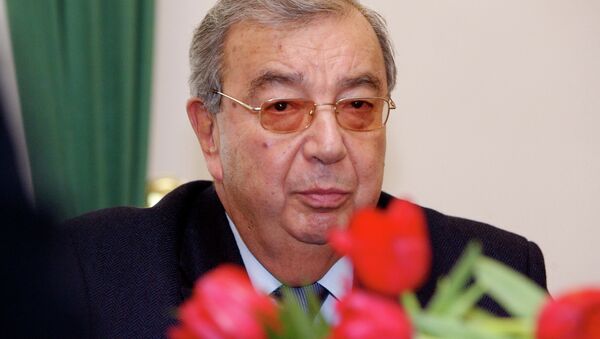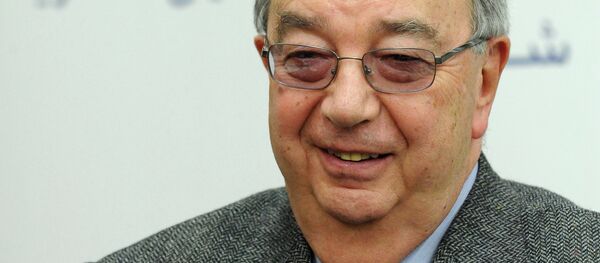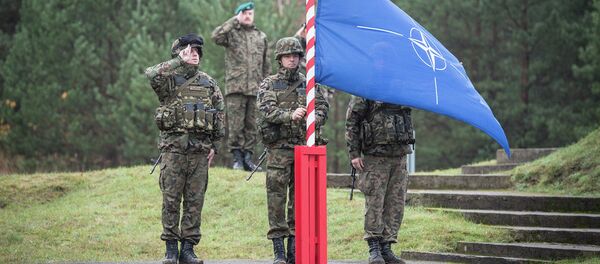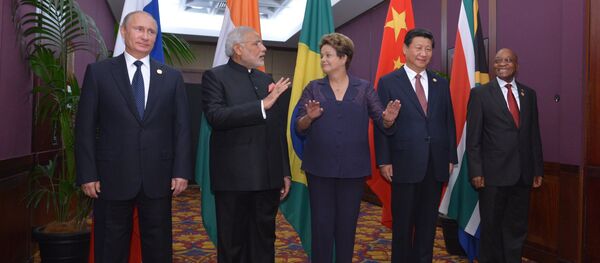Between 1956 to 1970, Primakov worked as a journalist specializing in the Middle East for Soviet radio and newspapers, including Pravda.
In 1970, Primakov took up the post of Deputy Director of Moscow's prestigious Institute of World Economy and International Relations (IMEMO), a job he held until 1977, when he moved on to become the director of the Institute of Oriental Studies of the USSR Academy of Sciences. During this time, he also served as a deputy chairman of the Soviet Peace Committee. Primakov returned to the IMEMO in 1985, serving as director until 1989.
From August to December 1991, Primakov temporarily served as the first deputy chairman of the KGB. After the dissolution of the Soviet Union in December 1991, Primakov was appointed Director of Russia's Foreign Intelligence Service, a post which he held until 1996.
The Primakov Doctrine
An early proponent of the principal of multilateralism opposed to US global hegemony, Primakov became known in the West as an opponent of NATO's eastward expansion, while focusing Russian diplomacy on the improvement of relations with the states of the former Soviet Union and the Middle East. While falling short of his demands, the NATO-Russia Founding Act on Mutual Relations, Cooperation and Security, signed in 1997, eventually led to the formation of the Russia-NATO council, charged with handling joint projects and relations between Moscow and the defense Bloc.
Primakov was noted to have been one of the early proponents of a Russian-Chinese-Indian strategic triangle, aimed at counterbalancing the United States. The ideal of enhanced cooperation promoted by the foreign minister would eventually evolve into the BRICS group of nations.
Commenting on Primakov's legacy as foreign minister on the occasion of his 85th birthday last October, Russian Foreign Minister Sergei Lavrov stated that he was confident that "in the near future, historians will coin a special term to describe Primakov's role in politics. They may call it the Primakov Doctrine. The moment he took over, the Russian Foreign Ministry heralded a dramatic turn of Russia's foreign policy. Russia left the path our Western partners had tried to make it follow after the breakup of the Soviet Union and embarked on a track of its own."
A Prime Minister Charged With Saving His Country From Economic Catastrophe
In the months leading up to the default, facing a political crisis, President Boris Yeltsin dismissed the entire cabinet of Prime Minister Viktor Chernomyrdin, and then that of acting Prime Minister Sergei Kiriyenko. Failing to get his candidates for PM approved by parliament, and contending with an enraged conservative and communist opposition, Yeltsin nominated Foreign Minister Primakov as a compromise candidate. Primakov was approved by overwhelming majority on September 11, 1998.
Restoring political stability by inviting members of the leading parliamentary factions into his Cabinet, Primakov's interest rate and monetary easing policies assisted Russian producers with an infusion of cash, allowing enterprises to pay backlogged wages, pay off their debts, and begin to pay taxes, while hiring new workers and reducing unemployment for the first time in years. With more money in Russians' pockets, consumer demand stabilized. The resolution of the 1998 crisis is considered to have laid the foundations for Russia's economic recovery in the 2000s.
Maintaining his stance on defending Russian interests abroad, on March 24, 1999, Primakov canceled his scheduled visit to the United States when he found out that NATO had begun a bombing campaign of Yugoslavia, turning his plane around over the ocean, a maneuver which has since been nicknamed 'Primakov's loop.'
In May 1999, having served as prime minister for only eight months, Primakov was dismissed by Yeltsin, with Russian analysts describing the move as a political calculation connected with the prime minister's growing popularity, and the upcoming presidential elections scheduled for the following year.
Commenting on Primakov's service as prime minister, Lavrov stated that the politician was "a phenomenon not only in our foreign policy, but in the Russian state, because after he was invited to head the Russian government he made the decisive contribution to overcoming the effects of the 1998 default and crisis. His government patched a large hole and made it possible to restore the country to stability."
Primakov is survived by his wife Irina and daughter Nana, losing his first wife, Laura Kharadze, who died of heart disease in 1987, and his son Alexander, who died of a heart attack at age 27 in 1981. The veteran journalist, diplomat and politician spoke Russian, Arabic, English, and Georgian.








